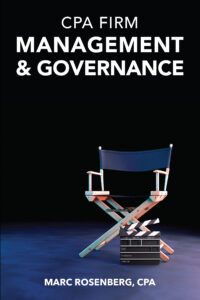Managing Cash Flow: 10 Tips from MPs
 The coronavirus crisis has cast a surreal cloud over every aspect of our lives. To say that businesses are in uncharted waters would be an epic understatement. No one has all the answers. But as is the case in any crisis, as we work through it, we start to pick up best practices from each other. This is certainly happening in the CPA profession.
The coronavirus crisis has cast a surreal cloud over every aspect of our lives. To say that businesses are in uncharted waters would be an epic understatement. No one has all the answers. But as is the case in any crisis, as we work through it, we start to pick up best practices from each other. This is certainly happening in the CPA profession.
Beyond keeping everyone healthy, one of the biggest concerns at CPA firms is cash flow. For traditional firms that receive a significant portion of their revenue during March – May, cash receipts may suffer, perhaps substantially. With filing deadlines extended and clients impacted, this busy season is shaping up to look quite a bit different from the past.
Most firms we talk to are continuing to operate with a tax season mentality, especially for individual clients, albeit relaxed somewhat due to productivity challenges. The key for all projects is to finish your work and collect. But with many clients suffering steep sales and profit declines, the risk of collection shortfalls is increasing daily.
We talked with several managing partners over the past week to hear what they are doing to manage cash flow. Here are ten practices they are currently following:
- Finish returns, bill clients, and collect. While the struggle is difficult and real for many individuals and businesses, the economic impact is likely going to get worse before it gets better. Ask for payments before completing e-file forms. Do your best to get invoices out and payments in before things get worse.
- Apply for an increase on your credit line.
- Consider keeping cash in savings instead of paying down existing credit line draws or discretionary costs that can be deferred.
- Work with clients on payment terms as needed. If your restaurant client just shut their doors, can they partial pay or work out a payment plan with you for now? Consider asking your higher-risk clients to make automated credit card payments.
- Be prepared for fee negotiations. Hard-hit clients may ask for a price reduction. Are all your partners prepared for this? Do you have a plan for “how low” is acceptable or what price at which you’re willing to let them move to another firm? There could be a good pruning opportunity here for those clients who have hung around too long anyway.
- Evaluate next steps. If you can’t carry existing salaries with existing headcount, is there room for an across the board cut? How would your team react?
- Consider cutting overtime for hourly staff. This may work well given the deadline extension if it helps float salaries expense to retain team members.
- If there were any staff terminations looming (say someone who might have stayed on until “the deadline”), does it still make sense to keep them on for the next few weeks or months?
- Reduce partner draws and/or guaranteed payments. Under no circumstances should firms borrow money to prop up partner compensation levels, even in normal times.
- Look for opportunities. In addition to current cash-flow management, CPA firms across the country are telling us that they are spending more time with their clients due to the current crisis. Are there opportunities for you to consult with clients on navigating the myriad of confusing new laws, limits and stimulus programs? Don’t forget to have a plan, that’s clear to you and your clients, for how and when you’ll get paid for this work.
The Covid-19 crisis obviously extends into a larger, long-lasting conversation around what firms should be doing to plan for their survival, including capital needs, going forward. Stay tuned for future posts on this topic as our country and profession continues to work through the effects of the pandemic.

CPA Firm Management & Governance
Best practices for managing and structuring the leadership group; descriptions of both partnership and corporate styles; role of the managing partner and firm administrator; decision making; voting; the role of a partner and how the organization changes as the firm grows.
Learn More